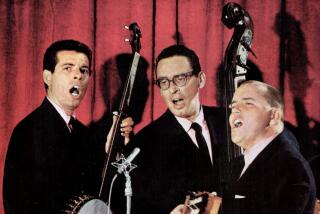For Lou Reed, ‘Lulu’ and ‘Metal Machine Music’ proved vision was pure
The music world is in mourning over the death of Lou Reed, the indescribably influential singer, composer and bandleader. He was one of the first to marry rock insouciance with high-art ideas: reducing the form of a guitar band to its absolute minimum, while sounding unprecedented and scary and occasionally even lovely. He put raw drones and white noise into the rock-instrument canon, and wrote about smack addiction and transvestism 40 years before “Molly” and rappers in Givenchy kilts seemed edgy.
But Reed was devoted to not giving a single damn about anybody’s opinion of his work. So it’s kind of fitting that he ended his career on a Metallica collaboration album, “Lulu,” that was uniformly despised by the music press, and left fans of both feeling cold and confused. It was the second LP in his career — the first was 1975’s “Metal Machine Music” — that made fans and critics wonder if he was just yanking all of our chains.
“Metal Machine Music” has since gained back some interest as a pioneer of industrial and noise music. But while writers are remembering the incalculable highs of Reed’s career, it’s worth remembering that his antagonistic streak was genuine, and not always in appropriate, critically beloved ways.
PHOTOS: Lou Reed | 1921-2013 | PHOTOS: Notable deaths of 2013
“Metal Machine Music” has a much better reputation now than at its release. Early reviews claimed it would clear any room of humans that tried to listen to it, and reams of books about the worst albums in rock history and most famous career-self-immolations have put it near the top. But Lester Bangs might have seen its contrarian ambitions in their true light — “As a statement it’s great ... it shows integrity — a sick, twisted, dunced-out, malevolent, perverted, psychopathic integrity, but integrity nevertheless.”
Listening now, it’s easier to hear the Eastern groans of La Monte Young and stuttering yelps of Stockhausen that allegedly influenced its creation. Parts of it, especially the opening track “Part 1” are genuinely pretty and quite delicately composed. The way Reed treated manipulated guitar feedback as an instrumental world in itself laid a path for bands and styles including heavy metal, Brian Eno, My Bloody Valentine, Nine Inch Nails and Health. You can hear why fans expecting a new “Sweet Jane” would be appalled, but it was also a lesson in just how Reed was generations beyond the rest of us in imagining what the rock-band format could accomplish. In the mid-2000s he finally assembled a band to play it, and sold-out shows across Europe.
PHOTOS: Celebrity Twitter reactions to Lou Reed’s death
Maybe time will tell something similar about “Lulu,” his pilloried collaboration with Metallica. On paper, it doesn’t sound like an impossible idea — four of heavy metal’s finest instrumentalists give direction by one of evil-rock-music’s masterminds. Add spoken-word lyrics and a concept-album twist based on the German playwright Frank Wedekind, and the whole thing sounds daffy enough to at least be interesting.
The reception, however, recalled Reed’s 1975 reactions. “If the Red Hot Chili Peppers acoustically covered the 12 worst Primus songs for Starbucks, it would still be (slightly) better than this,” wrote Chuck Klosterman in Grantland. Pitchfork gave it a 1.0 review, calling it “Audacious to the extreme, but exhaustingly tedious as a result, its few interesting ideas are stretched out beyond the point of utility and pounded into submission.” But like before, there were a few lone admirers, including the avant-garde UK magazine the Wire and NME, which called the album “Pretentious? Oui. Self-important? Natch. Any cop? Pretty damn fine actually.”
The artists seemed to enjoy the vitriol, and Metallica said it reminded them of prior fans-freakouts over their own “Fade to Black.” Reed said Metallica fans “are threatening to shoot me, and that’s only because I showed up.... They haven’t even heard the record yet, and they’re recommending various forms of torture and death.”
Today, the music press is lionizing Reed, and appropriately. He forever altered what music, art, sex, drugs and America felt like. But as we pile on the accolades, it’s worth remembering the times we didn’t — and what that says about the depth and purity of Lou Reed’s artistic imagination.
ALSO:
Lou Reed put the underground front and center
Lou Reed dies, singer remembered by friends and fans
Lou Reed dies, rock critic Robert Hilburn remembers him as “The warmest guy”
More to Read
The biggest entertainment stories
Get our big stories about Hollywood, film, television, music, arts, culture and more right in your inbox as soon as they publish.
You may occasionally receive promotional content from the Los Angeles Times.







